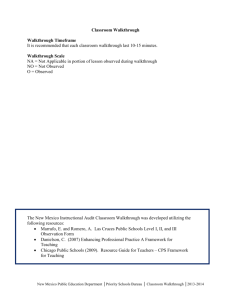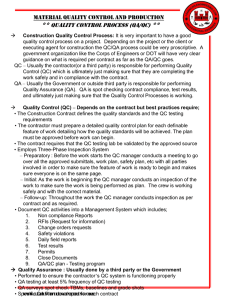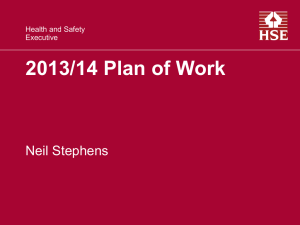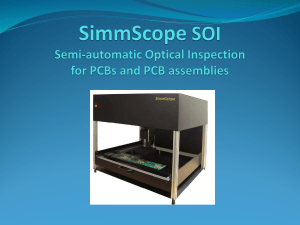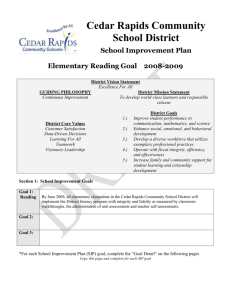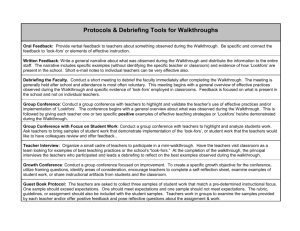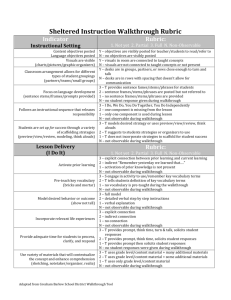Reviews
advertisement
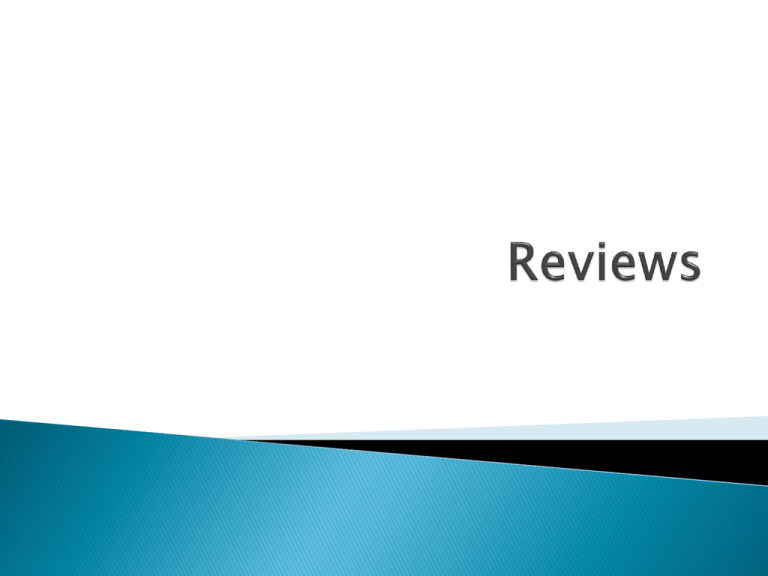
Every stage from phase DESIGN in Software Development Process will have “design document” especially in analysis and design phases. “Design document” is a document that will record all the progress of the development work in every stage. The S.A who prepared the document will check in order to detect any error. In addition, development team leader are also will check this document before granting their approval to the next phase. However, it is clear these are also the people that involved in producing the document, they are unlikely to detect some of their own error. Therefore, only “others” such as peers, expert or customer representative are capable to review the document. After completing this chapter, you will be able:◦ Explain the direct and indirect objectives of review methodologies. ◦ Explain the contribution of external expert ◦ Compare the three major review methodologies. The review objective will be divided into two categories which is Direct Review Objective and Indirect Review Objective. Direct review objective will deal with the current project. Indirect review objective is more general in nature, deal with the contribution member knowledge and improvement of the development methodologies applied by the organization. Direct Objective ◦ ◦ ◦ ◦ To detect analysis and design errors as well as subjects where corrections, changes and completions are required To identify new risks likely to affect the project. To locate deviations from templates, style procedures and conventions. To approve the analysis or design product. Approval allows the team to continue on to the next development phase. ◦ Team members who need to coordinate their own codes with code modules developed by “non-complying” team members can be expected to encounter more than the usual number of difficulties when trying to understanding the software developed by the other team member. ◦ Individuals replacing the “non-complying” team member (who has retired or been promoted) will find it difficult to fully understand his/her work. ◦ The design review team will find it more difficult to review a design prepared by a non-complying team. ◦ The test team will find it more difficult to test the module; Indirect objectives ◦ To provide an informal meeting place for exchange of professional knowledge about methods, tools and techniques. To record analysis and design errors that will serve as a basis for future corrective actions. The secretary is expected to perform the reporting task efficiently. However, it is expected that for performing the task he/she will require many clarifications to ensure correct reporting. The clarification questions will break the natural flow of review discussion, at least causing some waste of time. In cases where no clarification is requested by the secretary one may expect a proportion of wrong or incomplete documentation. Reporting by the coordinator himself is expected to be much more accurate and to mention the main findings. Variously called “design review”, “DRs” and “formal technical review (FTR)”. Different with other review where this is the only review that are necessary for approval of the design product.. Without this approval, the development team cannot continue to the next phase. Conducted at any development milestone requiring completion of analysis or design document. DPR – Development Plan Review SRSR – Software Requirement Specification Review PDR – Preliminary Design Review DDR – Detailed Design Review DBDR – Data Base Design Review TPR – Test Plan Review STPR – Software Test Procedure Review VDR – Version Description Review OMR – Operator Manual Review SMR – Support Manual Review TRR – Test Readiness Review PRR – Product Release Review IPR – Installation Plan Review The choice of appropriate participants is of special importance because of their power to approve or disapprove a design product Review leader Because review leader is a major factor affecting the DR’s success, certain characteristic are to be looked for this position: ◦ Knowledge and experience in development of projects of the type reviewed. ◦ Seniority at a project level is similar if not higher than that of the project leader. ◦ A good relationship with the project leader and his team. ◦ A position external the project team Therefore, example of the candidate will be development department’s manager, chief software engineer, leader of another project, head of software quality assurance unit. Review team Should be selected: ◦ ◦ ◦ ◦ Senior members of the project team Customer-user representatives Software development consultant Recommended for non-project staff to make up majority of the review team. Review leader preparations ◦ Appoint team members ◦ Scheduled the review sessions ◦ Distribute design document among the team members Review team preparations ◦ Review design document ◦ List their comments prior to the review session It is important that review session be scheduled shortly after the design document has been distribute to the review team members. Because to reduce the risk of going off schedule. A short presentation of the design document. Comments made by members of the review team. Verification and validation of comments is discussed to determine the required action items (corrections, changes and additions). ◦ ◦ Verification:- Process of evaluating a system or component to determine whether the product of a given development phase satisfy the condition imposed at the start of the phase. Validation:- Process of evaluating a system or component during or at end of the development process whether it satisfies specified requirement. Decisions about the design product (document), which determines the project's progress: Full approval. ◦ Enable immediate continuation to the next phase of the project. Partial approval. ◦ Approval of immediate continuation to the next phase for some parts of the project with major action items is needed. Denial of approval. ◦ Demands a repeat of the DR. This decision is applied in case of multiple major defects or critical defects. Apart from DR report, the DR team is required to follow up performance of the corrections and check the corrected session. DR Report One of the review leader responsibilities is to issue the DR report after review session. Early distribution enables the development team to perform the corrections earlier and minimize the delays of the project schedule. Report major sections contain: Summary of the review discussions Decision about continuation of the project Full list of the required actions Name of the review team members assigned to follow up corrections performance. Two peer review method 1. Inspection 2. Walkthrough Major difference between formal design and peer review is their participant and authority. Participant: DR participant are superior position to the project leader and customer representative. Participant in peer review are project leader, member of the department and other unit. Degree of authority and objective review method Formal design review are authorized to approve the design document. This authority is not granted in peer review which the main objective for peer review is detecting errors. Different between inspection and walkthrough ◦ Inspection is more formal than walkthrough ◦ Inspection emphasizes the objective of corrective action ◦ Walkthrough are limited to comments on the document review. Review leader (moderator) The author Specialized professionals: ◦ Designer ◦ Coder or implementer ◦ Tester Review leader (coordinator) The author Specialized professionals: ◦ Standards enforcer ◦ Maintenance expert ◦ User representative Properties Overview meeting Design review No Inspection Yes Participant’s preparations Review session Yes - thorough Yes - thorough Yes - brief Yes Yes Yes Yes Yes No No Yes No No Yes No Follow-up of corrections Formal training of participants Participant’s use of checklists Error-related data collection Review documentation Not formally required Formal design review report Formally required 1) Inspection session findings report 2) Inspection session summary report Walkthrough No Not formally required Task:- ◦ Preparing expert judgment about document. ◦ Participating as a member of internal design review, inspection or walkthrough team. Will give more advantage in the following situations: ◦ Insufficient in-house professional capabilities in specialized area ◦ Lack of in-house professional due to workload pressures. ◦ In small organizations, where the number of suitable candidates for review team is insufficient.

